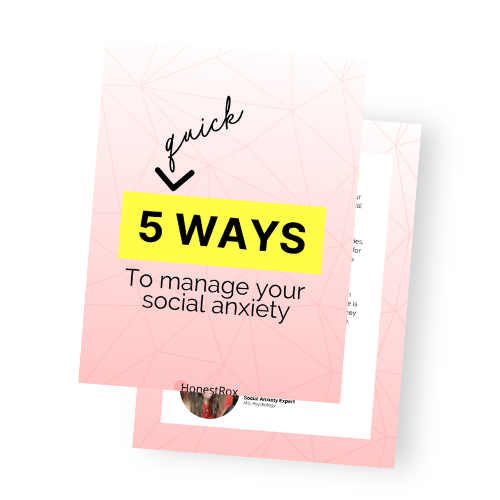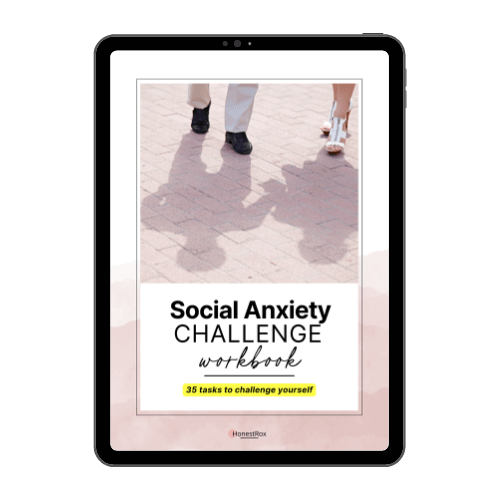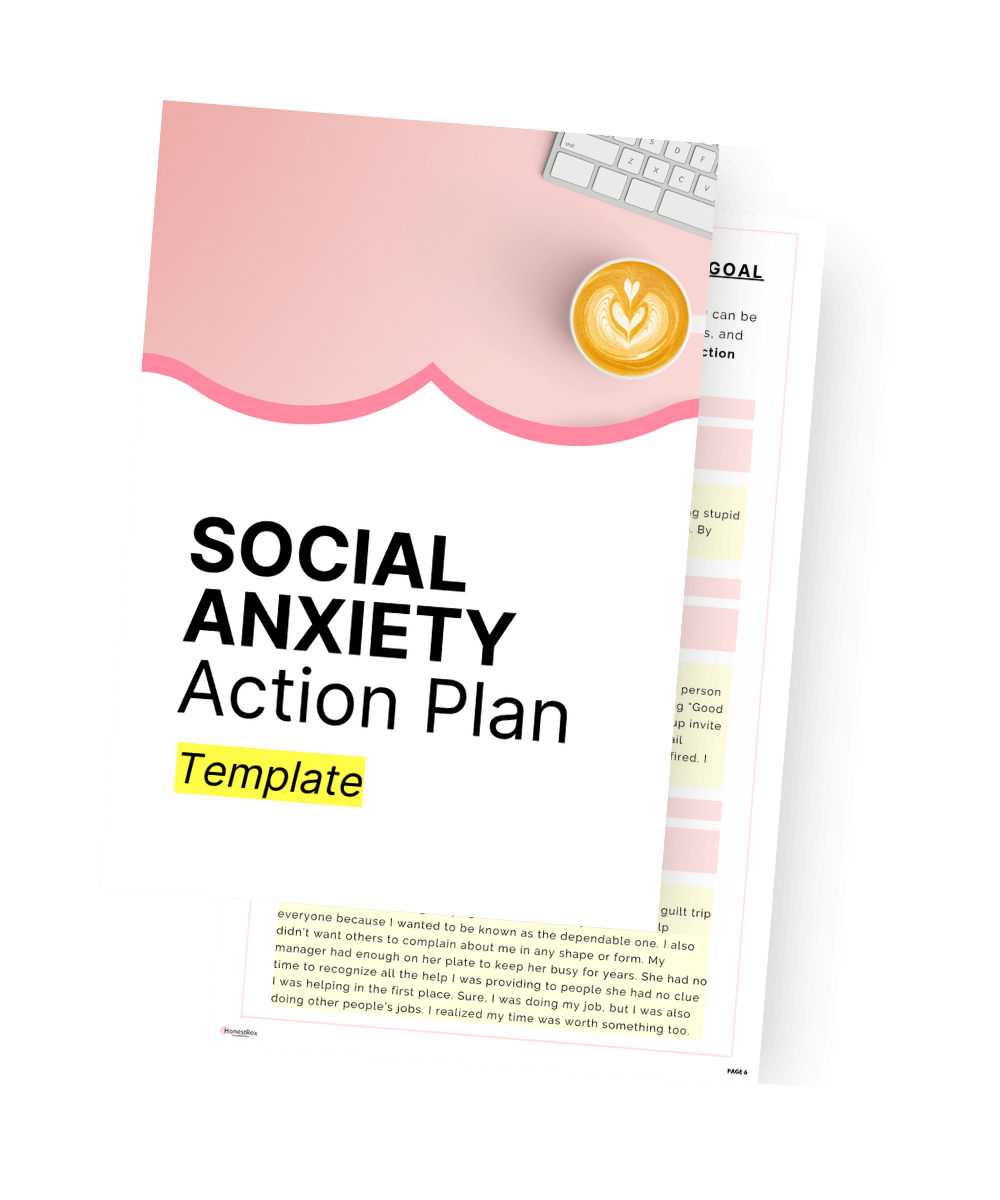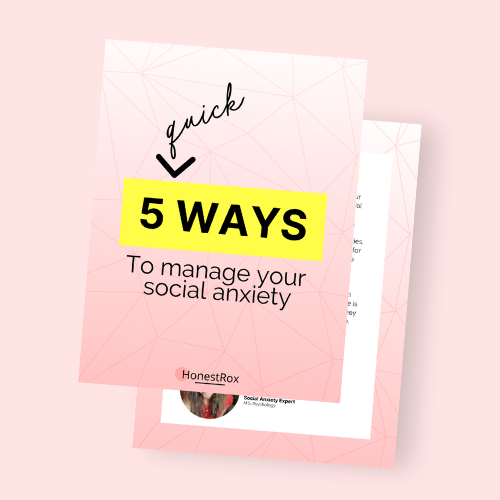
Social Anxiety
How to handle on the spot conflict
A personal story (made out of two situations) that made me come to this realization
Let’s talk about conflict, but more specifically how to handle on-the-spot conflict.
I have a feeling that that is something that you also try to avoid as much as possible.
Conflict and social anxiety do not go hand in hand by any means.
Socially anxious people might prefer to leave, ghost, and do anything to avoid a confrontation. But it is possible to engage in conflict and still feel at peace with yourself.
It’s not easy. It’s a process. It’s a journey. It takes effort. But there are some things that you can do. And trust me, my whole life, I did everything to avoid conflict.
I’ve avoided uncomfortable conversations because I didn’t want to upset anybody. I used to be okay with being upset and disappointed at others, but I wasn’t okay with others being disappointed or upset with me.
How dare I speak my truth and share my opinions?
For many years, I’ve allowed other people’s truths and opinions to rule over mine, even when those were damaging to the general well-being of society.
And it comes down to learning how to speak at the right moment in time.
While yes, it’s uncomfortable, conflict does create the change that we all seek.
I hated conflict so much that I tended to apologize even when I knew I was right, just so that it would go away.
But I’m here to tell you that the conflict does not go away. It continues deep within us.
We replay the discussion over and over and over in our heads with logical and reasonable comebacks. We always know what to say after the fact.
After we’ve calmed down, but it’s too late because by that time we already hate ourselves for not having the courage to say anything at the right time.
“If you avoid conflict to keep the peace, you start a war inside yourself.”
Because of course, conflict doesn’t magically disappear. We become the outlet.
While this article is about dealing with conflict, it’s not about conflict with the people in your life. It’s about on-the-spot conflict that arises out of nowhere and makes your blood boil instantly.
When you know you should say something but don’t because you’re too scared it will lead to you being punched by a stranger. But the alternative of holding it in isn’t much healthier.
I want to walk you through how to handle on-the-spot conflict.
So, you do walk away at peace with yourself.

5 Quick Ways To Manage Your Social Anxiety
There’s no substitute for effort, but you can speed up the process if you understand and take these 5 ways seriously. This is your starter pack; what you do with it is up to you.
Now, if you Google how to handle conflict, there are many articles, and they’re excellent ones. And they all revolve around one core component.
Whatever you do, do not bottle up your thoughts and emotions. Let the other person know, or else you will implode.
And that’s something that can be very hard for most of us, especially if you have social anxiety. So this advice never really worked for me, because I always chose to bottle things up and take the hit.
So while there’s a lot of good in those articles, don’t take everything at face value. You need to assess your temperament and personality and see where it fits.
But while I was going through the articles, I realized that none of them address on-the-spot conflict where you only have a few seconds to address the other person, or else the opportunity will be lost forever.
And it’s not about making a good impression, especially if someone does something malicious or unjust.
But it’s about making sure you say what you want and go home without feeling like you bottled things up.
There’s nothing worse for me than to walk away from someone and feel like I wasn’t true to myself. All because I wanted them to like me or not have a bad impression of me. Ugh. Yuck.
Here are three immediate things you can do to give your brain space to think and react accordingly.
I said accordingly because the first business order is to ensure that your anger isn’t on display. You do not want to be emotional. You do not want to come off angry.
People shut down at people who come at them.
So, let’s say you’re being reproached or reprimanded for doing something that you think is within your rights, or that isn’t disturbing someone else’s peace.
- Maybe you freeze and you don’t know what to do, you hope that they’re going to stop talking and everything will get resolved and you can just go home.
- Or maybe you go offensive, yell at them, and dismiss what they have to say.
- Or maybe you have empathy for what they are saying and you can see why they’re pissed.
So while all of these are perfectly natural responses to someone reprimanding you, I want you to try your best to suppress them and instead:
1. Smile
Yes, it sounds counterintuitive, but think about it for a second. You’re probably feeling anger, resentment, shame, embarrassment, you know, mostly negative emotions.
You need to push those to the back of your mind. It’s hard to be rational when you’re experiencing those emotions.
So smiling will center you. It will help you stop the onslaught of emotions coming at you. And it will also trip the other person up because they’re probably expecting a very different reaction from you.
After you put up that smile to deflect the situation at hand, what do you do?
2. Repeat what they said
Sometimes we need time to assess a situation and how we’re going to respond to it. So, try to buy some time.
You want to avoid spitting out what’s on your mind since usually, that’s when you end up regretting the most. Refrain from responding out of line.
What helps is to repeat back what the person said as much as you can, as a statement.
Some people will realize how unreasonable they are. In any case, once you say it back, I can almost guarantee you that they’ll have more to say. They’ll keep going. They’ll give you more information.
And this buys you even more time to think about how you want to respond.
Okay, so now at this point, you’ve collected yourself, you’re in a much more stable state of mind.
Before you proceed with giving this person a piece of your mind:
3. Ask yourself the following questions
- Did I do something wrong?
If yes, then explain your thought process to the person in simple words without any emotional outbursts. Let them know what led to you doing something or saying something that made them react. If your answer is “no” and you know you didn’t do anything wrong, go to the next question:
- Why does this person feel this way?
You’re a great observer, and you’re very self-aware, so you can easily put yourself in someone else’s shoes. You can immediately figure out why this person was ticked off. Do what you can with that information. Let them know you understand their perspective.
Once you pinpoint what they’re pissed about, address it in the way you would with a five-year-old. When my son has a full-blown tantrum and is coming for me, I immediately deflect by stating what he’s feeling and why.
By defining emotion and labeling it, the person will feel immediately understood.
Usually, people back off when they feel understood, so the best course of action is to make sure that they feel heard.
- How can I resolve this so I walk away unconflicted inside?
This is the trickiest question to answer, but by now you should feel more calm. And this is a part where you either choose to continue with whatever it is that you were doing that pissed the other person off.
Either you stand your ground or you decide to apologize and stop.
I often feel better when I apologize, but other times it makes me sick to my stomach if I do because I might have violated my principles.

5 Quick Ways To Manage Your Social Anxiety
There’s no substitute for effort, but you can speed up the process if you understand and take these 5 ways seriously. This is your starter pack; what you do with it is up to you.
I want to use an incident in the news to illustrate how this works in the real world.
A man was birdwatching in Central Park when he noticed a woman was walking her dog off-leash, which was against park rules.
So this man confronted her. He walked up to her and asked her to put the leash on the dog. Now imagine in this scenario that you’re the woman and someone is reprimanding you for not following the rules.
Let’s say you freeze, and to avoid escalating the situation, you smile at the man.
The next thing you do is to repeat back to him what he said. You could say something like this: Hi, you want me to put a leash on my dog here in the park, right?
The man will probably say that it’s against the park rules to have a dog off-leash, and he wouldn’t feel comfortable if everyone was walking their dog this way.
Now at this point, you ask the questions:
Did I do something wrong? Kind of, yes. Even though you think your dog is well-behaved and there’s no one around, rules are rules.
Why does this person feel this way? You think that maybe he’s been attacked by a dog before that was off-leash, or his dog was attacked, which is why he’s uncomfortable with dogs being off-leash.
You can label what they are feeling and say something like this: I hope I’m not making you uncomfortable. He’s an adorable dog and he stays by my side. I know it’s against park rules, but there’s no one here and he loves running around.
How do I resolve this? There are two things you can do. You can put the leash back on and apologize (maybe take it off again later), or you stay off-leash (you stand your ground).
So those are kind of like the two alternatives.
Whatever you do, you do have to ask yourself, how important is it for you to “win”?
Is one of your principles threatened? Will you regret not saying anything? Only you know that. This is a minor thing, a violation of park rules, but some situations could like get you incensed and make your blood boil.
It will be harder to be calm, smile, and repeat what they’re saying, but if you follow this formula, it will ground you and keep you calm in a situation.
Which is a better alternative than to walk away with that anger, take it home, and then take it out on your family?
And that’s not to say take it out on a stranger by any means, but if you have the tools to resolve it on the spot, then I recommend you do that.
The more you practice these steps, the easier it will be to respond appropriately.
I tend to find these types of conflicts much harder to stomach than those with people I know. I can give myself time to think, cool down, and get back to someone I know. I can marinate my words for days before sharing them.
With on-the-spot conflict, we don’t have that luxury.
You don’t have the luxury to marinate your words, to put things together in an eloquent way. The words have to find a way out on time, or else they will sit with you, and that is what you want to avoid at all costs.
Now, hopefully, you’re not running into too many of these situations, but try these steps out the next time and let me know how you feel.
If at some point this week you run into a conflict like this and you have a hard time doing some of these steps, which is understandable, don’t hold your anger in. Go home and write your thoughts out.
Please put them on paper. Don’t bottle your emotions. Do whatever it takes to shake it off and just get them. out of your body
If you’re out and about, and someone reprimands you, there are a few things you can do to stay calm during this on-the-spot conflict that arises.
The 3 steps are:
- Smile
- Repeat back what they said
- Ask yourself the following questions:
- Did I do something wrong?
- Why does this person feel this way?
- How can I resolve this so I walk away unconflicted?
Practice this formula so that you don’t take home your anger because you were too scared or worried to say something.

I'm Roxana

I went from being scared to ask a question out loud to hosting summits online. I love coffee, french crepes, and working from home. My mission? Help others build their social confidence to make friends, have conversations, and be comfortable around people!
Did you find value in my content? Support me by clicking the button!
Recent blog posts
Latest Episode

About the blogger
I'm Roxana Alexandru
As a social anxiety expert I share my best strategies and tips that I’ve learned on my journey to help you manage your social anxiety.
Like what you see here?
Check out the blog!
Must Reads
Grab these freebies
Free Challenge
5 tasks. 3 difficulty levels. Test your social anxiety through exposure therapy.
Grab these freebies
Free Template
Get the template that I personally used and create your own steps for your journey.
A podcast meant to help you be comfortably you, no matter the situation. My goal is to give you the confidence to go out into the world, share your worth, build meaningful relationships, and see yourself as highly capable. It all starts with being your awkward self comfortably.
Awkward together
The “Be socially confident” newsletter drops weekly to inspire, entertain, motivate, and educate you about social anxiety (who knew it could be so much fun?!). Honestly, if anything, you’ll get a kick out of my own experiences and the funny GIFs.

Call me Rox!
I’m obsessed with social anxiety. In a healthy way! After a decade of being debilitated by it, I finally have the tools I need to manage it (the journey itself is no joke). I now use my experience to help others.













